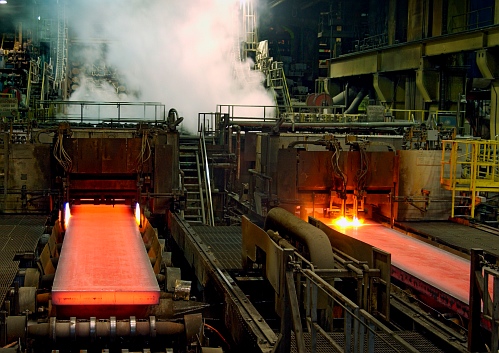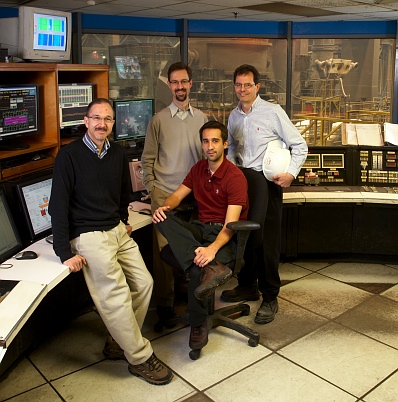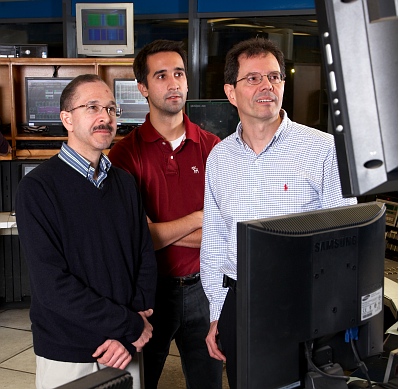
Forging collaboration: McMaster’s academic-industry partnership
January 19, 2010
By André Voshart
Keeping tight control over steel production at ArcelorMittal Dofasco’s industrial slab casters requires precise and resilient control. Established in 1912 (but currently a standalone subsidiary of ArcelorMittal), the Hamilton, Ont.-based steel-producing mainstay has maintained its longevity by constantly finding new, innovative ways to boost efficiency.
 “Our product is steel,” is the first half of the company’s slogan, followed by, “Our strength is people,” which is reflected by its urge to use local knowledge to find ways to keep making what it has always made, but better. Since 1991, the steelmaker has harnessed the strength of the students and faculty at McMaster University (also in Hamilton), collaborating on several innovative process control applications, and for the past 16 years has been a member of the awarding-winning McMaster Advanced Control Consortium (MACC).
“Our product is steel,” is the first half of the company’s slogan, followed by, “Our strength is people,” which is reflected by its urge to use local knowledge to find ways to keep making what it has always made, but better. Since 1991, the steelmaker has harnessed the strength of the students and faculty at McMaster University (also in Hamilton), collaborating on several innovative process control applications, and for the past 16 years has been a member of the awarding-winning McMaster Advanced Control Consortium (MACC).
For more than two decades, this consortium has been working with industry to advance process automation and control in a variety of industries, spanning chemical, petroleum, pharmaceutical, steel, pulp and paper, and food. Established in 1988 to promote industrial-academic research, its goal is to educate engineers and scientists through formal degree programs (Masters and Ph.D) and training programs, such as short courses and workshops; develop and demonstrate cutting-edge, advanced technologies in process control; and promote two-way communication between industrial and academic partners, leading to technology transfer.
 The research is currently directed by six faculty members (with a combined total of 48 years of industrial and 86 years of academic experience), complimented by 15 to 20 graduate students, a research engineer, post-doctoral fellows at various points in time, and three to five undergraduate research students. Current MACC director Christopher Swartz, a professor of chemical engineering, was among several consortium participants who accompanied Manufacturing AUTOMATION on a tour of Dofasco’s continuous casting facility. This is where the MACC and the steelmaker have implemented an automation system using multivariate statistical (MVS) technologies, which monitor the process under start-up, steady-state and transitional operating conditions and alert operators to deviation outside of typical conditions.
The research is currently directed by six faculty members (with a combined total of 48 years of industrial and 86 years of academic experience), complimented by 15 to 20 graduate students, a research engineer, post-doctoral fellows at various points in time, and three to five undergraduate research students. Current MACC director Christopher Swartz, a professor of chemical engineering, was among several consortium participants who accompanied Manufacturing AUTOMATION on a tour of Dofasco’s continuous casting facility. This is where the MACC and the steelmaker have implemented an automation system using multivariate statistical (MVS) technologies, which monitor the process under start-up, steady-state and transitional operating conditions and alert operators to deviation outside of typical conditions.
Michael Dudzic, general manager of the process automation group at ArcelorMittal Dofasco and a pre-consortium McMaster graduate, says the MACC has helped the steelmaker improve quality and efficiency by managing its large volumes of process and product data. From this data, he says, “useful information and better process knowledge can be gained and shared in a timely fashion. The key challenge becomes how to readily and simply be able to exploit all the useful information content from a large amount of process and product data in a timely fashion.
“The problem in achieving the above … is that often a significant number of the process variables are highly correlated to each other. Compounding the problem is the fact that a typical data set includes a large number of noisy and possibly missing measurements. Under these circumstances, the use of traditional analysis and modeling technologies can be both time-consuming and produce results that do not capture all the useful information contained in the data.”
ArcelorMittal Dofasco has implemented many projects using MVS technologies, saving millions through detection of errors in a production process as soon as they occur or by providing the capacity to monitor and predict a process to ensure a desired outcome. It has innovated several highly marketable steel-making process control technologies, which has gained the company the reputation of being a world-class innovator in automated process control technology.
Swartz agrees that the introduction of these technologies can be directly attributed to their membership in MACC.
The MACC began with five member companies, and membership has grown to an average of 15 per year and has included Air Products and Chemicals, Alcoa, Algoma Steel, DuPont, ExxonMobil/Imperial Oil, Frito-Lay, Honeywell, Johnson Controls, Petro-Canada, Praxair, Shell Global Solutions and Suncor … to name only a few.
And even through several economic downturns, the MACC has continued to thrive.
How the MACC works
Most importantly, the MACC does not merely deliver theoretical solutions and train graduates for employment by industrial members; the member companies are directly involved in the research through activities, such as problem formulation, mentoring students and field-testing concepts. The research is conducted through a combination of graduate research, post-doctoral research, undergraduate research projects (independent study for credit, as well as summer employment projects) and contract research.
 David Gerardi, a second-year chemical engineering Master’s student, who has Swartz as a supervisor, is currently working on streamlining raw material purchasing at Dofasco’s primary steelmaking operations to determine the quantities of each material (coal, scrap metal and iron ore pellets) that should be purchased for any given time period, taking into account purchasing and production costs. As for his experience, he has nothing by great things to say.
David Gerardi, a second-year chemical engineering Master’s student, who has Swartz as a supervisor, is currently working on streamlining raw material purchasing at Dofasco’s primary steelmaking operations to determine the quantities of each material (coal, scrap metal and iron ore pellets) that should be purchased for any given time period, taking into account purchasing and production costs. As for his experience, he has nothing by great things to say.
“I enjoy the family feel of the program,” he says. “There is a strong emphasis placed on presentations and interaction among students so that everyone is aware of each other’s research work.”
When Gerardi initially discovered he wanted to pursue graduate studies in process systems, he asked previous employers — who all held graduate degrees from universities other than McMaster — for advice. “They unanimously agreed that McMaster would be the best choice,” he says. “To me, this spoke of McMaster’s reputation within industry for the quality of their students and the institution.”
Reiterating this sentiment is John MacGregor, co-founder of the consortium and Distinguished University Professor at McMaster: students’ feedback, he says is generally enthusiastic. “They realize they are going to get the type of education they can’t get in other areas.”
While the research is typically conducted at McMaster, plant visits to the companies are common, and lengthier internships, where appropriate, have also been carried out. The member company is typically involved throughout the project evolution: from problem definition to providing project support and plant validation, to transfer of research results into their processes.
All MACC company members pay an annual fee, which over the life of the consortium has generated more than $4 million. This funding, complemented with NSERC and other federal and provincial government programs, has permitted the consortium to run a world-class operation with state-of-the art computing and software resources, host annual conferences and support cutting-edge research. In addition to the funding, the industry partner provides plant personnel time; provision of plant data, including operating data, process information and operating policies; and industrial experience.
However, MacGregor emphasizes that the MACC wants a partner, not just the money. “They have to participate.”
To help facilitate participation and idea transfer, the MACC hosts a one-day annual meeting, which typically includes an overview of research developments by the MACC faculty, a graduate student poster session, technical presentations by industrial members and a business meeting. A subsequent two-day workshop involves presentations on a topic selected at the previous year’s business meeting, and includes speakers from both academia and industry.
MacGregor says there is lots of interaction and that ideas are often sparked through discussions related to presentations. “These people will recognize where the technology you’re developing is important, and they get enthused about it.”
Current student Gerardi also lauds the conference: “Not only is it a great networking opportunity, but it shows that the program understands the importance of conducting practical research of high quality.”
Additionally, the diversity of research areas and industrial sectors promotes lateral thinking, cross-fertilization of concepts and the generation of new ideas. “As an example,” Swartz says, “advanced control methods that were initially developed for a lumber company, Tembec, have also been applied to the food industry in Frito-Lay’s plants, with both companies achieving significant benefits through cost savings and/or improving product quality.” He adds that collaboration between Tembec and Dofasco was also sparked through their interaction with MACC.
As the academic partner, MACC faculty conduct advanced research in this area and contribute research personnel, technical expertise that builds on theoretical knowledge in relevant technologies. This collaboration has resulted in highly trained, employable graduates producing significant technological advances that have been developed further and implemented at the member companies.
To date, MACC-related projects have generated 90 graduate students, 35 of whom completed Ph.D degrees, and 55 with Master’s degrees. The high technical skills that MACC graduate students develop through their course work at McMaster and their industrially relevant research make them sought-after and valuable assets to the Canadian process industries and their technology suppliers.
And as a McMaster graduate since 1995, Vit Vaculik, manager of the advanced automation technology team at ArcelorMittal Dofasco, explains that graduates “are highly sought after in industry, and they have gone on to make a great impression in industry.” Dofasco alone, he says, has hired “quite a few McMaster alumni” in its process automation group.
Outside opportunities
A significant impact of MACC has been the formation of spin-off company ProSensus, incorporated in 2004 and currently residing at nearby McMaster Innovation Park (which opened its doors last year), further advancing the research done at MacGregor’s lab at the university. “At McMaster,” MacGregor says, “my group developed a whole class of multivariate statistical methods for extracting information from large industrial data bases and using them for analyzing/troubleshooting process problems, on-line monitoring of process health and on-line control and optimization of processes and products.”
The company provides advanced solutions and software to companies like DuPont, Alcoa, GlaxoSmithKline and Pfizer to analyze industrial data for improved process control. MacGregor says ProSensus provides consulting services on analyzing process problems, develops and installs on-line imaging solutions for product quality control, develops and installs on-line advanced batch control systems for the control of final product quality, provides technology for the scale-up and optimization of industrial processes, and provides technology for the rapid development of new products based on using companies’ diverse manufacturing, pilot plant and laboratory databases.
The spin-off currently employs five full-time engineers, including recent graduate Mark-John Bruwer, and has been self-financed since incorporation.
When Bruwer first applied to the MACC program in 2001, he had already been in the industry for five years working on model-predictive control at Pavilion Technologies, but moving forward, he wasn’t interested in doing anything hypothetical. A former colleague encouraged him to pursue graduate studies as a basis for an advanced technical career and recommended MacGregor’s research program. The two factors that stood out to Bruwer were McMaster’s world-recognized work and that the focus was very industrially relevant. “Coming from industry myself,” he says, “the latter factor was an important consideration for me.”
So once he began his studies at McMaster in January 2002, “the benefits of the program under MACC were as I had anticipated: a pool of world renowned professors in the process systems engineering field, all engaged in leading edge research with strong industrial relevance.”
Now, as chief technology officer of ProSensus, Bruwer gets the best of both worlds by pursuing leading-edge technology developments (akin to a research institute) and the engaging directly with industrial clients. “I was also attracted by the challenge of helping ProSensus transition from a start-up company to an established provider of products and services in its field,” he added.
Looking ahead
The MACC’s structure and operation are designed to maximize the research productivity to the university and member companies. In October 2009, the consortium was recognized with a Leo Derikx Synergy Award from the Natural Sciences and Engineering Research Council of Canada, which recognizes an established innovative model of long-standing university-industry partnership in pre-competitive research and development that has improved the general well being of an industry.
Swartz accepted the award on behalf of consortium members. Winning universities currently receive a $200,000 NSERC research grant.
“Much credit must be given to the founders of the consortium who had the foresight to understand the benefits of universities and industry working together in research and development,” he said in response to the award.
David Wilkinson, dean of the faculty of engineering at McMaster, says the MACC serves as a model for how industry and academia can work together successfully. “I am proud of the creativity and leadership shown by my colleagues in the faculty who have demonstrated how to build deep, long-lasting industrial partnerships.”
“Success stories such as this demonstrate that there are ways to build and maintain a strong and vibrant manufacturing industry in Canada,” says Mo Elbestawi, the university’s vice-president of research and international affairs.
Numerous awards to MACC faculty and invitations to present seminars, plenary talks and keynote addresses evidence the high reputation of research at McMaster. In 2002, MacGregor and colleague Thomas Marlin were joint recipients of the Kalev Pugi Award from the Society of Chemical Industry for “outstanding work in bringing together the McMaster Advanced Control Consortium (MACC) as a model research and development project with Canadian and international industry.”
MACC continues to thrive after 21 years, and McMaster’s Swartz welcomes any push toward this type of collaboration at schools across Canada. “There has been an increasing trend in recent years toward research collaboration between academia and industry, supported by both national and provincial funding agencies through several programs designed to achieve this goal. This, in my view, has been a major step forward, with significant benefits to both industry and academia.”
Member companies have reported savings of millions of dollars per year that he says can be attributed to interactions with MACC. “MACC has had a further impact on the Canadian manufacturing industry through the many highly-skilled graduate students who have joined companies in several industrial sectors, who are making a significant contribution through the development and application of advanced process automation technologies.”
Echoing this sentiment, ArcelorMittal Dofasco’s Dudzic says one of the key differentiating capabilities of working with MACC is their knowledge of process industries and the class of problems that we face. “Knowing this,” he says, “they are able to more effectively introduce advanced technologies that they believe are applicable in helping us solve our problems or optimize our operations.”
Adds Vaculik: “You couldn’t find a better academic partner than this.”
macc.mcmaster.ca
www.dofasco.ca
Advertisement
- Canada extends assistance for manufacturing and processing sector
- Machine Automation Safety Congress returns in May